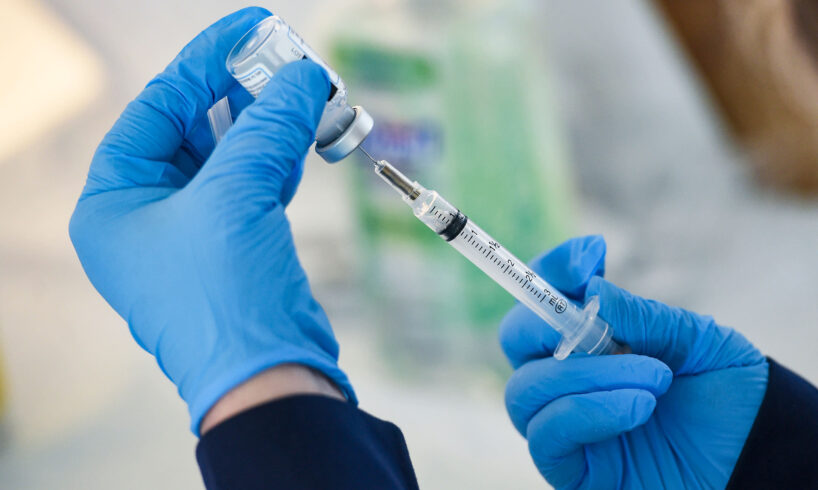
Dozens of people told the Indiana Senate Health Committee they no longer support a COVID-19 vaccination exemption bill that now has the support of the business community after changes were made in the committee.
House Bill 1001 passed the House on Jan. 18, with language related to religious exemptions, saying employers “must allow” exemptions when employees state in writing they are declining the vaccination because of a “strongly held religious belief.”
The bill as amended now only refers only to federal law – Title 7 of the Civil Rights Act of 1964.
Under Title 7, an employee can file a complaint with the Equal Employment Opportunity Commission if they believe their employer violated Title 7 of the Act by denying their request for a religious exemption. If the commission finds in their favor, they are then granted a “right to sue.” The EEOC complaint process can take a year or more, and attorneys often charge $10,000 or more upfront to take this kind of case, one witness testified.
Leah Wilson, the founder of Stand for Health Freedom, said the bill now contains “grossly inadequate protections” for workers.
It’s imperative, she said, senators “protect one of the most sacred rights of Hoosiers, which is bodily autonomy.”
Business organizations, however, praised the changes, saying private businesses should have the right to operate their businesses without government interference.
“What’s gone is all the more punitive parts of the bill…so now it’s back to the at-will employment doctrine,” said Andrew Berger, a lobbyist with the Indiana Manufacturers Association.
Caryl Auslander, speaking on behalf of the South Bend Regional Chamber of Commerce and other business organizations, said government shouldn’t be involved in private business, and said “employers know best” what they need to do to protect their workforce, including mandating the COVID-19 vaccination.
Representatives of the Indy Chamber and the Indiana Chamber of Commerce, both of which previously opposed the bill, said they are also now supporting it.
Hannah Zambrano, a student in the Purdue University College of Pharmacy, asked senators to amend the bill again to protect all people of the state, saying all pharmaceutical products, including vaccines, carry risks.
“Where there is risk, there must be a choice, and I don’t believe that should be a controversial statement,” she said.
The amendment, which was offered by the bill’s sponsor in the Senate, Sen. Mark Messmer, R-Jasper, makes several other changes as well, including allowing employers to test employees for COVID-19 twice a week, rather than just once, and allows them to require employees cover the cost of testing themselves.
The bill as it passed the House had said testing could be not more than once a week and had to be offered at no cost to the employee. It had been amended in the House to say employers could seek reimbursement from the state for the cost to employers. This has now been taken out.
The bill now exempts health care workers in the state and removed passages that said employers are prohibited from taking “adverse employment action” – such as demoting or firing an employee – for requesting or receiving an exemption to their COVID-19 vaccination mandate.
Also gone is language that said an employee who is fired for not getting the vaccination cannot be disqualified from receiving unemployment compensation.
In addition to hospitals and nursing homes, the amended bill would exempt employers that operate “a professional sports organization or entertainment complex.”
For the exemption related to natural immunity, it says an employee may be tested every three months, rather than every six months.
Robin Clark, an engineer previously employed by Eli Lilly in Indianapolis, said she was fired after the company denied her request for a medical exemption and then told her she was past the deadline to get a religious exemption. She said employees need a state law to secure their liberty.
“Discrimination is going on and we need protection,” she said.
Dan Stock, a functional medicine physician with a practice in Fishers, told senators that as amended, the bill would be “harmful” to Hoosiers, and said studies now show natural immunity lasts as long as 18 years.
Matt Bain, a neurologist employed by IU Health, said he was granted an exemption from his employer’s COVID-19 vaccination mandate, but has treated several patients suffering from transverse myelitis and other neurological issues that he said were caused by the vaccine.
The COVID-19 vaccines, he said, offer little protection and have “negative efficacy” for the current strain of the virus.
The bill passed out of committee 8-2, with two Democrats on the committee voting “no” and all Republicans voting “yes.” Sen. Ryan Mishler, R-Bremen, however, said in explaining his vote that he was concerned that those people the bill was to protect are now opposing it. He said he would vote for the bill only to keep it moving, but that he may not vote for it in the end.
This article was originally posted on Indiana Senate committee changes COVID-19 vaccination exemption bill